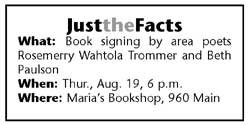
For Colorado poets Rosemerry Wahtola Trommer and Beth Paulson, poetry
exists everywhere. An unwanted dandelion crushed under
foot, a circling raven, a child's abandoned red sand bucket, and a trembling
aspen leaf, are all fodder for their work.
Inspired by mountains, rivers and deserts, Trommer, of Telluride, and
Paulson, of Ouray, capture and celebrate the simple things in life.
Both encourage us, the readers, to re-examine the natural world, for
we may just find reflections of ourselves in nature's footprints. Thus,
it is most appropriate that they share a book signing at Maria's Bookshop
this Thursday, Aug. 19.
Nestled within a pale green gift box upon which an elegant flower is
embossed is Trommer's latest poetry collection, Insatiable (Sisu
Press). This intimate and interactive design conveys Trommer's insatiable
love for life and her desire to entice both poetry aficionados and poetry-phobes.
The book's title is drawn from Trommer's poem "Insatiable" and represents
Trommer's hunger for life and desire to praise the beauty and mystery
of the natural world: "Until we abandon these human husks of longing,/
let our eyes and ears be ravenous, let our noses be apostles,/ and let
our lips be insatiable and vigorous with praise." The book begins with
the poem "Transmutation," which introduces one of the unifying themes
in this collection - the transience of life. The poem opens, "Every
day, our bodies alter-/ new cells, new wrinkles" and ends with the aging
body victoriously "making the long journey/ from flesh to nectar to
wine." The ending work, "Poem for a Practical Man," humorously describes
a poet's struggle to articulate in verse her love for a practical man.
The solution is comical, "If poetry won't work,/ let's try glue."
Through vivid concrete images such as "the sweet smell of wheat," the "dark
velvet of Kona," and "your words are like chocolate," Trommer leaves
the taste of her words emblazoned upon the senses. In her exploration
of the cyclical parallels between the natural and human world in "Trust," Trommer
leads the reader into a deeper understanding of emotional landscapes: "Just
because spring has/ come before./ Maybe this time it won't./ Maybe the
cycle has failed./ Things break./ Ask my heart." In "Inscribed" Trommer
invites the reader to join in a conversation with nature, "Palms forward,
I gather the day/ in a great embrace/ as I, too,/ am gathered into a
wider circle/ inscribed by red sandstone and sun." Many of Trommer's
poems meditate upon the wonders of the natural world and serve as guide
through internal and external landscapes.
Insatiable achieves balance in style and tone, bouncing
between musical free verse and sonorous sonnets that are humorous, serious,
sensual and spiritual. She conveys delight in playing with language,
rhyme and meter in the sonnet "Making the Bed," which offers an unforgettable
lesson in bed-making, ending in the clever couplet, "The knack for well
made beds proves quite precise-/ But in the unmaking waits paradise." By
marrying new ideas with traditional poetic forms, Trommer indeed creates
verse that is sparkling and new. "At its best," Trommer says, "poetry
speaks to many people," and the poems in Insatiable do this
well by revealing the extraordinary in the ordinary.
An artist's eye for color is the guiding force behind many of Paulson's
uplifting poems in The Company of Trees (Ponderosa
Press) . The three sections in this work reflect her diversity
and versatility. Her collection opens with "By Stone, By Water and Other
Poems" which draws inspiration from cranes, coyotes and columbine, and
continues with "Sometimes When I Breathe Deep" which offers fictionalized
autobiographical narratives in various settings. "Straw Hats" completes
this collection with a powerful tribute to the imagined lives of artists
and childhood memories.
A love for the rhythms of words as well as an affinity for her surroundings
characterize Paulson's poetry. Many of her poems are didactic, containing
poignant lessons learned from nature. In "What the Desert Said," the
water whispers, "the worth is not in what you take/ but in what you
leave for others," and later in "Moths" the wind shows the reader how
to "shed what was not essential (clothing, hair, skin), the parts easily
broken," and "Morning: Woods Lake" asks the reader to "listen/ for the
lake to reveal/ any other miracles."
Like Trommer, Paulson sees the sublime in trash and encourages the
reader to find splendor in unlikely places. For example, her poem "Except
for Crows" challenges traditional ideals of beauty by praising the crow, "slick
in a silk suit," and asks the reader "to ignore all the trash talk/
and to believe in the beauty/ of their own blackness." Through honest
descriptions in "Whitehouse Mountain," Paulson shows the reader how
to find refuge in poetry and "find shelter under these towering peaks,/
this high ridge line sun sweeps/ where today snow explodes."
Throughout The Company of Trees , the reader feels
connected to the poems, a goal foremost in Paulson's mind. What makes
Paulson's poetry distinctive is her attention to detail combined with
a flair for translating abstract ideas into polished verse. "Red Sand
Bucket," which describes the nourishing power of one golden childhood
memory, is one of the best, bringing the collection to a fitting close: "Yet
the bucket's red and real,/ half-buried in the shore at dusk,/ and to
replay just one beach day in August,/ it's enough."
A strong sense of place and an ability to recreate a child's sense
of wonder unite these two poets, whether you seek "The Company of Trees" or
have an "Insatiable" curiosity.
|